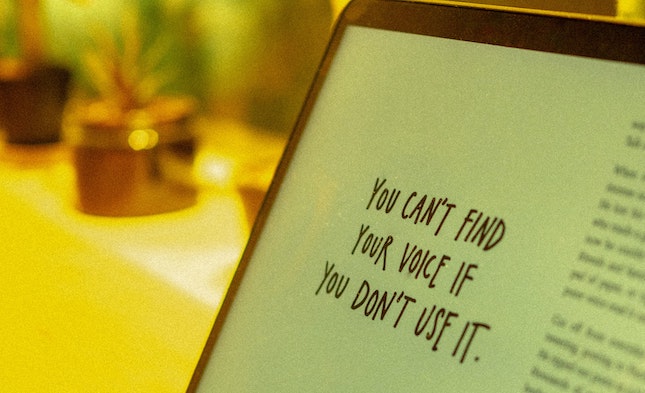How To Conquer Writer Fear, Deal With It, and Finish Your Story

There are dozens and dozens of reasons to write, but if you ask writers, they’ll tell you they thought about giving up. It’s easy to think about giving up when you’ve been working on a project. Perhaps you wrote ten chapters in your novel but ran out of steam.
At some point in the novel-writing process, almost every author wonders if the story is good enough to keep going. Self-doubt creeps in about their craft. Or, the plot doesn’t seem to work. Or, they’re bored with a character.
What do stalled writers do when they think about giving up?
They hit pause. And then they hit refresh. And keep hitting refresh until the story takes their fancy once again.
Here Are Some Ways To Get Back to Writing
If you’re burned out, don’t force yourself to hold on. You can always find yourself in a temporary slump if you just grant yourself permission to take a break from writing.
This enormous gap in perspective usually happens when you are well into your story, somewhere around the middle, or well into the last act. You disassociate from the story. It feels as though you are high on a cliff looking down and you’ve lost sight of your vision. You cannot evaluate your writing.
Revisit Why You Are Writing
You are writing a mystery, creating a puzzle for your readers. Mystery readers are not scrutinizing every sentence for the mot juste or intricate syntax. You are not aiming for a great literary masterpiece. You are writing to entertain your readers.
Stop Comparing
Your favorite mystery author may have a skill that is not yours. They may pull out the feelz or make the antagonist scary. If that’s not your skill, stop comparing. Your readers will love your mystery for your skills.
Go Back Into Your Story
Read your story, so far, as a reader. Two things will happen. You’ll find you enjoy the story. That means it isn’t drivel. And the other is, as you read, you may find places you want to edit. Do those edits. They’ll get you back into reality mode with your story.
Self-Doubt Is The Number One Writer Fear
Blame it on your amygdala, part of your body’s alarm system. Located at the root of your brain, the amygdala does everything it can—automatically—keep you safe. If there is risk, the amygdala sends out signals to keep your body safe. Creativity is risk. Fear will happen.
You’ll get fear-lessening signals of every kind.
- My writing sucks.
- That just-out-of-college and read 10 books editor who rewrote everything was right. My writing sucks.
- My Mom/Sister/Uncle/Spouse/Best Friend hates it. No one will like it. I should quit now.
You’re a writer. You know what the fears are. They don’t go away. So, if you are a beginning writer, know that these fears are going to pop up. The key is to recognize the fears and calm them down.Best-selling author Caroline Leavitt says in a recent interview on The Writer,
So you can’t listen to what people say. There will always be people telling you “you can’t do this,” or “I don’t like this.” There are so many writers who have gotten 80,000 rejections and then suddenly they sell a book and it’s a huge critical and commercial success. So you never know. Just keep writing.
Self-doubt manifests as self-censorship, so one of the best ways to calm that fear is to keep writing until you find your voice. That unique voice that makes a reader love what you write.
So, keep writing. Don’t get thrown off track. Focus on your current project and your long-term writing goals.
Fear of Rejection
One major element of writer fear is rejection. Just about anyone can trigger rejection fear. You can find yourself in a shutdown of getting your work out, even for help from professionals like editors. So, you can end up not sharing your work, even bits of it, with other people.
- Other writers
- Readers
- Editors
- Agents
On the one hand, adverse reactions happen. I have writer friends who have received devastating comments from editors who didn’t understand their genre and terse rejection letters from agents. They found others and published their books with success.
Join A Writer Group
One of the best ways to combat this fear is to join a local writer’s group. To start, find a mutually supportive group with fewer than ten people and make certain they are simpatico. Avoid groups with:
- An overbearing “leader”
- Without group guidelines
- A group that doesn’t follow the stated guidelines or allows members to captivate time
Don’t hesitate to leave if the group doesn’t fit.
The people in the group are also writers with the same fears. Every writer has fears.
Other writers understand your fears. You’ll discover that other writers are one of your best fear conquering connections.
So Many Fears
As if self-doubt and fear of rejection weren’t enough, writer and writing coach Jurgen Wolff has identified seven basic writer fears in his book Your Writing Coach:
- Rejection
- Inadequacy
- Success
- Exposing Yourself
- Only One Book
- Too Old to Write
- Fear of Research
And, I’m sure you, as a writer, can add your personal list.
With so many fears lurking in your writer’s mind, it’s easy to succumb. Writers who succeed keep writing.
The Determination Antidote
Know that doubts are going to creep in. They never go away. But you can work to minimize the fear. The best antidote to writer fear is determination.
Continue to write and not let fear bring your creativity to a halt. Continue to stand up to fear, no matter what—even when fear temporarily wins.
Author and writing coach Joanna Penn calls working on your work the “palette cleanser.” Get the taste of those fears out and work to find your writer voice by continuing to write. She talks about The Successful Author Mindset in a recent podcast. This is a great talk to bookmark, so you can listen when those fears pop up.
Evaluate Your Fears
Realize that every writer has feelings of inadequacy about their work and about themselves. Experience those doubts as part of the writing process.
You’ll find you can deal with the doubts, overcome the fear, and teach yourself how to continue writing.
Photo by Elisa Ventur on Unsplash






